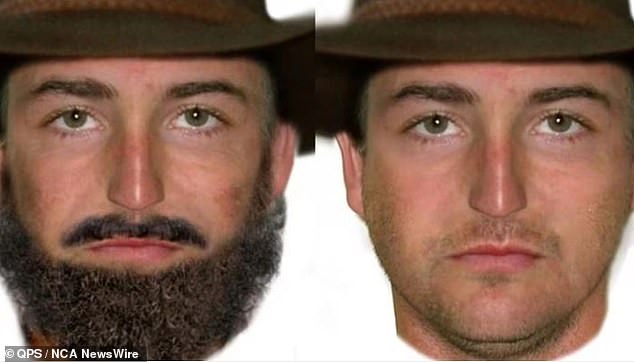A convicted rapist who kidnapped, drugged and raped a German backpacker will be released from prison after winning an appeal to overturn a decision to keep him behind bars.
Peter Van de Wetering was jailed for nine years and declared a serious violent offender in 2016 after pleading guilty to several violent offenses dating back to 2013, including kidnapping, rape and administering a narcotic drug.
Van de Wetering had pleaded guilty to the depraved attack on the backpacker, then 19, who had traveled to become his nanny on a farm outside Stanthorpe in August 2013.
The 2013 attack drew comparisons to the Australian horror film Wolf Creek.
Van de Wetering’s nine-year sentence was due to expire on October 6 of this year.
But his release was put on hold after the Queensland Attorney-General tried to stop Van de Wetering from being released from jail, arguing he posed an ongoing risk to the community.
In September, the court determined Van de Wetering was unfit to be released and granted the Queensland Attorney-General’s application.
The convicted rapist challenged the decision in the Queensland Court of Appeal, arguing that the trial judge had erred in not considering the proposed strict supervision order, the likelihood of Van de Wetering complying with the order and the “consequences of non-compliance.” “.
Peter Van de Wetering (pictured) was sentenced to nine years in prison and declared a serious violent offender in 2016.
Court of Appeal President Judge Debra Mullins accepted Van de Wetering’s appeal on Wednesday.
Judge Mullins ordered that Van de Wetering be released from prison on an interim supervision order, which he must comply with.
Part of the interim supervision order requires Van de Wetering to follow strict rules, including not being able to leave Queensland unless approved, having only one mobile phone, not using drugs or alcohol, and must attend rehabilitation if required. your corrective services officer.
Van de Wetering must also comply with any requests made by his correctional services officer, including providing them with any information about where he lives, what type of employment he might hold and whether he drives a vehicle.
The interim order states that you must also wear a monitoring device if required by your assigned correctional services officer and follow any curfew they may establish.
You should also not establish contact with the victim or anyone you know.
An additional condition of his release would also require Van de Wetering to obtain written approval from his correctional services officer if he wants to possess anything that can take a photograph or video, including his mobile phone.
The strict decision comes after Van de Wetering posted an advert under a false name to hire a nanny on a farm outside Stanthorpe, Queensland.
The German backpacker, then 19 years old and who had only been in Australia for two weeks, responded to the ad in August 2013.
Van de Wetering arranged a bus ticket for the woman after the couple agreed he would pick her up at the Cottonvale bus stop.
Upon arrival at the bus stop, Van de Wetering was wearing a false wig, beard and mustache.

The nine-year sentence imposed on Van de Wetering (pictured) was due to expire on October 6 this year.

The German backpacker was taken to a remote property (pictured) near Stanthorpe in 2013.
As the couple returned to the rural property, Van de Wetering offered the woman some chocolate, which she accepted, but did not eat it without his knowledge.
Van de Wetering had drugged the chocolate in an attempt to stun the woman.
When the couple arrived at the abandoned property, Van de Wetering tied the woman’s hands before tying her to a bed, where she struggled against him in an attempt to free herself.
He then forced her to eat more drugged chocolate.
The woman was knocked unconscious shortly after she was forced to eat the chocolate.
Hours later, the woman woke up on the side of the road and Van de Wetering was nowhere to be seen.
The woman realized she still had her phone and called her sister in Germany.
A police investigation was launched leading to Van de Wetering’s arrest in October 2014 in Sydney.

Van de Wetering was seen on CCTV (pictured) by police during their investigation.
The investigation found that Van de Wetering had planned the attack for months before meeting the German backpacker, including purchasing a false wig, beard and mustache.
Van de Wetering was finally sentenced to nine years in prison in 2016 for kidnapping, rape, attempted rape, deprivation of liberty, sexual assault, common assault, robbery, administration of a narcotic drug and attempted narcotic drug.
The attempt to keep him behind bars after his Oct. 6 release date was based on evidence provided by two forensic psychiatrists, who separately assessed Van de Wetering for parole, and the Crown earlier this year.
Both psychiatrists advised against Van de Wetering’s release due to the high risk of recidivism.
However, Judge Mullins, in overturning the decision to keep Van de Wetering in prison past his October 6 release date, ordered that an interim supervision order was appropriate to mitigate any concerns raised by the Attorney General’s office. of Queensland.
“An interim supervision order would be appropriate to identify any escalation in the type of risk posed by the appellant to allow for meaningful intervention before the risk occurs,” Judge Mullins said in her decision published on Wednesday.
The Queensland Attorney General has the right to ask the courts, under the Dangerous Prisoners (Sex Offenders) Act 2003, to keep certain people locked up if they are found to pose a risk to society.


